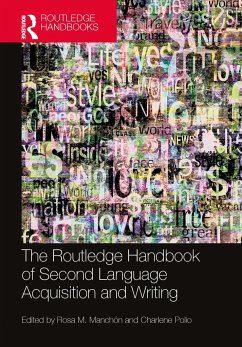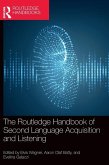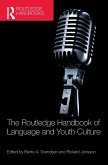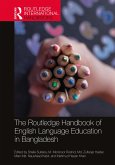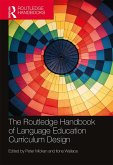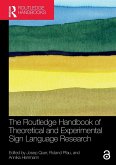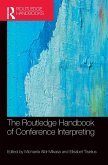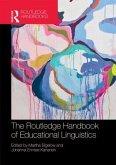The Routledge Handbook of Second Language Acquisition and Writing
Herausgeber: Manchón, Rosa M.; Polio, Charlene
The Routledge Handbook of Second Language Acquisition and Writing
Herausgeber: Manchón, Rosa M.; Polio, Charlene
- Gebundenes Buch
- Merkliste
- Auf die Merkliste
- Bewerten Bewerten
- Teilen
- Produkt teilen
- Produkterinnerung
- Produkterinnerung
This unique state-of-the-art volume offers a comprehensive, systematic discussion of second language (L2) writing and L2 learning. Led by experts Rosa Manchón and Charlene Polio, top international scholars synthesize and contextualize the salient theoretical approaches, methodological issues, empirical findings, and emerging themes in the connection between L2 writing and L2 learning, and set the future research agenda to move the field forward. This will be an indispensable resource for scholars and students of second language acquisition (SLA), applied linguistics, education, and composition studies.…mehr
Andere Kunden interessierten sich auch für
![The Routledge Handbook of Second Language Acquisition and Listening The Routledge Handbook of Second Language Acquisition and Listening]() The Routledge Handbook of Second Language Acquisition and Listening301,99 €
The Routledge Handbook of Second Language Acquisition and Listening301,99 €![The Routledge Handbook of Language and Youth Culture The Routledge Handbook of Language and Youth Culture]() The Routledge Handbook of Language and Youth Culture303,99 €
The Routledge Handbook of Language and Youth Culture303,99 €![The Routledge Handbook of English Language Education in Bangladesh The Routledge Handbook of English Language Education in Bangladesh]() The Routledge Handbook of English Language Education in Bangladesh305,99 €
The Routledge Handbook of English Language Education in Bangladesh305,99 €![The Routledge Handbook of Language Education Curriculum Design The Routledge Handbook of Language Education Curriculum Design]() The Routledge Handbook of Language Education Curriculum Design258,99 €
The Routledge Handbook of Language Education Curriculum Design258,99 €![The Routledge Handbook of Theoretical and Experimental Sign Language Research The Routledge Handbook of Theoretical and Experimental Sign Language Research]() The Routledge Handbook of Theoretical and Experimental Sign Language Research70,99 €
The Routledge Handbook of Theoretical and Experimental Sign Language Research70,99 €![The Routledge Handbook of Conference Interpreting The Routledge Handbook of Conference Interpreting]() The Routledge Handbook of Conference Interpreting303,99 €
The Routledge Handbook of Conference Interpreting303,99 €![The Routledge Handbook of Educational Linguistics The Routledge Handbook of Educational Linguistics]() The Routledge Handbook of Educational Linguistics352,99 €
The Routledge Handbook of Educational Linguistics352,99 €-
-
-
This unique state-of-the-art volume offers a comprehensive, systematic discussion of second language (L2) writing and L2 learning. Led by experts Rosa Manchón and Charlene Polio, top international scholars synthesize and contextualize the salient theoretical approaches, methodological issues, empirical findings, and emerging themes in the connection between L2 writing and L2 learning, and set the future research agenda to move the field forward. This will be an indispensable resource for scholars and students of second language acquisition (SLA), applied linguistics, education, and composition studies.
Hinweis: Dieser Artikel kann nur an eine deutsche Lieferadresse ausgeliefert werden.
Hinweis: Dieser Artikel kann nur an eine deutsche Lieferadresse ausgeliefert werden.
Produktdetails
- Produktdetails
- Verlag: Routledge
- Seitenzahl: 414
- Erscheinungstermin: 31. Dezember 2021
- Englisch
- Abmessung: 260mm x 183mm x 27mm
- Gewicht: 970g
- ISBN-13: 9780367189853
- ISBN-10: 0367189852
- Artikelnr.: 62799099
- Herstellerkennzeichnung
- Libri GmbH
- Europaallee 1
- 36244 Bad Hersfeld
- gpsr@libri.de
- Verlag: Routledge
- Seitenzahl: 414
- Erscheinungstermin: 31. Dezember 2021
- Englisch
- Abmessung: 260mm x 183mm x 27mm
- Gewicht: 970g
- ISBN-13: 9780367189853
- ISBN-10: 0367189852
- Artikelnr.: 62799099
- Herstellerkennzeichnung
- Libri GmbH
- Europaallee 1
- 36244 Bad Hersfeld
- gpsr@libri.de
Rosa M. Manchón is Professor of Applied Linguistics in the Department of English at the University of Murcia. Charlene Polio is Professor in the Department of Linguistics, Languages, and Cultures at Michigan State University, where she teaches in the TESOL and Second Language Studies programs.
Part 1 Introduction
Chapter 1
L2 writing and language learning
Rosa M. Manchón and Charlene Polio
Part 2 Theoretical Perspective
Chapter 2
Theoretical perspectives on L2 writing, corrective feedback, and language
learning in individual writing conditions
Ron Leow and Bo Ram Suh
Chapter 3
Theoretical perspectives on L2 writing and language learning in
collaborative writing and the collaborative processing of written
corrective feedback
Neomy Storch
Part 3 Core Issues: Tasks and Writing
Chapter 4
Task effects across modalities
Roger Gilabert and Olena Vasylets
Chapter 5
Task complexity studies
Mark Johnson
Part 4 Core Issues: Language Processing
Chapter 6
L2 writing processes and language learning in individual and collaborative
conditions
Marije Michel, Laura Stiefenhöfer, Marjolijn Verspoor, and Rosa M. Manchón
Chapter 7
Learners' engagement with written corrective feedback in individual and
collaborative L2 writing conditions
Julio Roca de Larios and Yvette Coyle
Part 5 Core Issues: Language Transfer and Writing
Chapter 8
Transfer, writing, and SLA: L2 writing as a multilingual event
Rob Schoonen and Sanne van Vuuren
Chapter 9
Multicompetence and L2 writing
Guillaume Gentil
Part 6 Core Issues: The Role of Individual Differences
Chapter 10
Age-related differences in L2 written performance and written corrective
feedback processing and use
Yvette Coyle and Julio Roca de Larios
Chapter 11
The role of cognitive individual differences in L2 writing performance and
written corrective feedback processing and use
Mohammad Javed Ahmadian and Olena Vasylets
Chapter 12
The role of motivational and affective factors in L2 writing performance
and written corrective feedback processing and use
Mostafa Papi
Part 7 Core Issues: Writing Research, Corrective Feedback, and Language
Development
Chapter 13
L2 writing and grammar development
Charlene Polio
Chapter 14
L2 writing and vocabulary development
Kris Kyle
Chapter 15
L2 writing and formulaic language: Formulaic chunks and lexical bundles
Hyung-Jo Yoon
Chapter 16
Written corrective feedback: Short-term and long-term effects on language
learning
EunYoung Kang and ZhaoHong Han
Chapter 17
The role of language in assessing L2 writing
Lia Plakans and Renka Ohta
Core Issues: Writing Research in Different Contexts
Chapter 18
Learning and teaching L2 writing in content and language integrated
learning (CLIL) contexts
Carmen Pérez-Vidal and David Lasagabaster
Chapter 19
L2 writing in study-abroad contexts
Cristi Killingsworth Vallejos and Cristina Sanz
Chapter 20
L2 writing and language learning in academic settings
Nigel Caplan
Chapter 21
L2 writing and language learning in electronic environments
Scott Aubrey and Natsuko Shintani
Part 3 Expanding research agendas
Chapter 22
Directions for future research on L2 writing, language learning, and
instructed SLA
Ron Leow and Rosa Manchón
Chapter 23
Directions for future research on attention and L2 writing
Sean Izumi and Osamu Hanaoka
Chapter 24
Directions for future research on SLA, L2 writing, and multimodality
Jungmin Lim and Matthew Kessler
Chapter 25
Directions for future methodologies to capture the processing dimension of
L2 writing and written corrective feedback
Andrea Révész, Xiaojun Lu, and Ana Pellicer- Sánchez
Chapter 26
Directions for future use of existing corpora in the study of L2 writing
Shelley Staples, Adriana Picoral, Aleksey Novikov, and Bruna Sommer-Farias
Chapter 27
Directions for future automated analyses of L2 written texts
Xiaofei Lu
Part 4 Coda
Chapter 28
Implications of SLA-oriented research for the teaching of L2 writing
Dana Ferris
Chapter 1
L2 writing and language learning
Rosa M. Manchón and Charlene Polio
Part 2 Theoretical Perspective
Chapter 2
Theoretical perspectives on L2 writing, corrective feedback, and language
learning in individual writing conditions
Ron Leow and Bo Ram Suh
Chapter 3
Theoretical perspectives on L2 writing and language learning in
collaborative writing and the collaborative processing of written
corrective feedback
Neomy Storch
Part 3 Core Issues: Tasks and Writing
Chapter 4
Task effects across modalities
Roger Gilabert and Olena Vasylets
Chapter 5
Task complexity studies
Mark Johnson
Part 4 Core Issues: Language Processing
Chapter 6
L2 writing processes and language learning in individual and collaborative
conditions
Marije Michel, Laura Stiefenhöfer, Marjolijn Verspoor, and Rosa M. Manchón
Chapter 7
Learners' engagement with written corrective feedback in individual and
collaborative L2 writing conditions
Julio Roca de Larios and Yvette Coyle
Part 5 Core Issues: Language Transfer and Writing
Chapter 8
Transfer, writing, and SLA: L2 writing as a multilingual event
Rob Schoonen and Sanne van Vuuren
Chapter 9
Multicompetence and L2 writing
Guillaume Gentil
Part 6 Core Issues: The Role of Individual Differences
Chapter 10
Age-related differences in L2 written performance and written corrective
feedback processing and use
Yvette Coyle and Julio Roca de Larios
Chapter 11
The role of cognitive individual differences in L2 writing performance and
written corrective feedback processing and use
Mohammad Javed Ahmadian and Olena Vasylets
Chapter 12
The role of motivational and affective factors in L2 writing performance
and written corrective feedback processing and use
Mostafa Papi
Part 7 Core Issues: Writing Research, Corrective Feedback, and Language
Development
Chapter 13
L2 writing and grammar development
Charlene Polio
Chapter 14
L2 writing and vocabulary development
Kris Kyle
Chapter 15
L2 writing and formulaic language: Formulaic chunks and lexical bundles
Hyung-Jo Yoon
Chapter 16
Written corrective feedback: Short-term and long-term effects on language
learning
EunYoung Kang and ZhaoHong Han
Chapter 17
The role of language in assessing L2 writing
Lia Plakans and Renka Ohta
Core Issues: Writing Research in Different Contexts
Chapter 18
Learning and teaching L2 writing in content and language integrated
learning (CLIL) contexts
Carmen Pérez-Vidal and David Lasagabaster
Chapter 19
L2 writing in study-abroad contexts
Cristi Killingsworth Vallejos and Cristina Sanz
Chapter 20
L2 writing and language learning in academic settings
Nigel Caplan
Chapter 21
L2 writing and language learning in electronic environments
Scott Aubrey and Natsuko Shintani
Part 3 Expanding research agendas
Chapter 22
Directions for future research on L2 writing, language learning, and
instructed SLA
Ron Leow and Rosa Manchón
Chapter 23
Directions for future research on attention and L2 writing
Sean Izumi and Osamu Hanaoka
Chapter 24
Directions for future research on SLA, L2 writing, and multimodality
Jungmin Lim and Matthew Kessler
Chapter 25
Directions for future methodologies to capture the processing dimension of
L2 writing and written corrective feedback
Andrea Révész, Xiaojun Lu, and Ana Pellicer- Sánchez
Chapter 26
Directions for future use of existing corpora in the study of L2 writing
Shelley Staples, Adriana Picoral, Aleksey Novikov, and Bruna Sommer-Farias
Chapter 27
Directions for future automated analyses of L2 written texts
Xiaofei Lu
Part 4 Coda
Chapter 28
Implications of SLA-oriented research for the teaching of L2 writing
Dana Ferris
Part 1 Introduction
Chapter 1
L2 writing and language learning
Rosa M. Manchón and Charlene Polio
Part 2 Theoretical Perspective
Chapter 2
Theoretical perspectives on L2 writing, corrective feedback, and language
learning in individual writing conditions
Ron Leow and Bo Ram Suh
Chapter 3
Theoretical perspectives on L2 writing and language learning in
collaborative writing and the collaborative processing of written
corrective feedback
Neomy Storch
Part 3 Core Issues: Tasks and Writing
Chapter 4
Task effects across modalities
Roger Gilabert and Olena Vasylets
Chapter 5
Task complexity studies
Mark Johnson
Part 4 Core Issues: Language Processing
Chapter 6
L2 writing processes and language learning in individual and collaborative
conditions
Marije Michel, Laura Stiefenhöfer, Marjolijn Verspoor, and Rosa M. Manchón
Chapter 7
Learners' engagement with written corrective feedback in individual and
collaborative L2 writing conditions
Julio Roca de Larios and Yvette Coyle
Part 5 Core Issues: Language Transfer and Writing
Chapter 8
Transfer, writing, and SLA: L2 writing as a multilingual event
Rob Schoonen and Sanne van Vuuren
Chapter 9
Multicompetence and L2 writing
Guillaume Gentil
Part 6 Core Issues: The Role of Individual Differences
Chapter 10
Age-related differences in L2 written performance and written corrective
feedback processing and use
Yvette Coyle and Julio Roca de Larios
Chapter 11
The role of cognitive individual differences in L2 writing performance and
written corrective feedback processing and use
Mohammad Javed Ahmadian and Olena Vasylets
Chapter 12
The role of motivational and affective factors in L2 writing performance
and written corrective feedback processing and use
Mostafa Papi
Part 7 Core Issues: Writing Research, Corrective Feedback, and Language
Development
Chapter 13
L2 writing and grammar development
Charlene Polio
Chapter 14
L2 writing and vocabulary development
Kris Kyle
Chapter 15
L2 writing and formulaic language: Formulaic chunks and lexical bundles
Hyung-Jo Yoon
Chapter 16
Written corrective feedback: Short-term and long-term effects on language
learning
EunYoung Kang and ZhaoHong Han
Chapter 17
The role of language in assessing L2 writing
Lia Plakans and Renka Ohta
Core Issues: Writing Research in Different Contexts
Chapter 18
Learning and teaching L2 writing in content and language integrated
learning (CLIL) contexts
Carmen Pérez-Vidal and David Lasagabaster
Chapter 19
L2 writing in study-abroad contexts
Cristi Killingsworth Vallejos and Cristina Sanz
Chapter 20
L2 writing and language learning in academic settings
Nigel Caplan
Chapter 21
L2 writing and language learning in electronic environments
Scott Aubrey and Natsuko Shintani
Part 3 Expanding research agendas
Chapter 22
Directions for future research on L2 writing, language learning, and
instructed SLA
Ron Leow and Rosa Manchón
Chapter 23
Directions for future research on attention and L2 writing
Sean Izumi and Osamu Hanaoka
Chapter 24
Directions for future research on SLA, L2 writing, and multimodality
Jungmin Lim and Matthew Kessler
Chapter 25
Directions for future methodologies to capture the processing dimension of
L2 writing and written corrective feedback
Andrea Révész, Xiaojun Lu, and Ana Pellicer- Sánchez
Chapter 26
Directions for future use of existing corpora in the study of L2 writing
Shelley Staples, Adriana Picoral, Aleksey Novikov, and Bruna Sommer-Farias
Chapter 27
Directions for future automated analyses of L2 written texts
Xiaofei Lu
Part 4 Coda
Chapter 28
Implications of SLA-oriented research for the teaching of L2 writing
Dana Ferris
Chapter 1
L2 writing and language learning
Rosa M. Manchón and Charlene Polio
Part 2 Theoretical Perspective
Chapter 2
Theoretical perspectives on L2 writing, corrective feedback, and language
learning in individual writing conditions
Ron Leow and Bo Ram Suh
Chapter 3
Theoretical perspectives on L2 writing and language learning in
collaborative writing and the collaborative processing of written
corrective feedback
Neomy Storch
Part 3 Core Issues: Tasks and Writing
Chapter 4
Task effects across modalities
Roger Gilabert and Olena Vasylets
Chapter 5
Task complexity studies
Mark Johnson
Part 4 Core Issues: Language Processing
Chapter 6
L2 writing processes and language learning in individual and collaborative
conditions
Marije Michel, Laura Stiefenhöfer, Marjolijn Verspoor, and Rosa M. Manchón
Chapter 7
Learners' engagement with written corrective feedback in individual and
collaborative L2 writing conditions
Julio Roca de Larios and Yvette Coyle
Part 5 Core Issues: Language Transfer and Writing
Chapter 8
Transfer, writing, and SLA: L2 writing as a multilingual event
Rob Schoonen and Sanne van Vuuren
Chapter 9
Multicompetence and L2 writing
Guillaume Gentil
Part 6 Core Issues: The Role of Individual Differences
Chapter 10
Age-related differences in L2 written performance and written corrective
feedback processing and use
Yvette Coyle and Julio Roca de Larios
Chapter 11
The role of cognitive individual differences in L2 writing performance and
written corrective feedback processing and use
Mohammad Javed Ahmadian and Olena Vasylets
Chapter 12
The role of motivational and affective factors in L2 writing performance
and written corrective feedback processing and use
Mostafa Papi
Part 7 Core Issues: Writing Research, Corrective Feedback, and Language
Development
Chapter 13
L2 writing and grammar development
Charlene Polio
Chapter 14
L2 writing and vocabulary development
Kris Kyle
Chapter 15
L2 writing and formulaic language: Formulaic chunks and lexical bundles
Hyung-Jo Yoon
Chapter 16
Written corrective feedback: Short-term and long-term effects on language
learning
EunYoung Kang and ZhaoHong Han
Chapter 17
The role of language in assessing L2 writing
Lia Plakans and Renka Ohta
Core Issues: Writing Research in Different Contexts
Chapter 18
Learning and teaching L2 writing in content and language integrated
learning (CLIL) contexts
Carmen Pérez-Vidal and David Lasagabaster
Chapter 19
L2 writing in study-abroad contexts
Cristi Killingsworth Vallejos and Cristina Sanz
Chapter 20
L2 writing and language learning in academic settings
Nigel Caplan
Chapter 21
L2 writing and language learning in electronic environments
Scott Aubrey and Natsuko Shintani
Part 3 Expanding research agendas
Chapter 22
Directions for future research on L2 writing, language learning, and
instructed SLA
Ron Leow and Rosa Manchón
Chapter 23
Directions for future research on attention and L2 writing
Sean Izumi and Osamu Hanaoka
Chapter 24
Directions for future research on SLA, L2 writing, and multimodality
Jungmin Lim and Matthew Kessler
Chapter 25
Directions for future methodologies to capture the processing dimension of
L2 writing and written corrective feedback
Andrea Révész, Xiaojun Lu, and Ana Pellicer- Sánchez
Chapter 26
Directions for future use of existing corpora in the study of L2 writing
Shelley Staples, Adriana Picoral, Aleksey Novikov, and Bruna Sommer-Farias
Chapter 27
Directions for future automated analyses of L2 written texts
Xiaofei Lu
Part 4 Coda
Chapter 28
Implications of SLA-oriented research for the teaching of L2 writing
Dana Ferris

